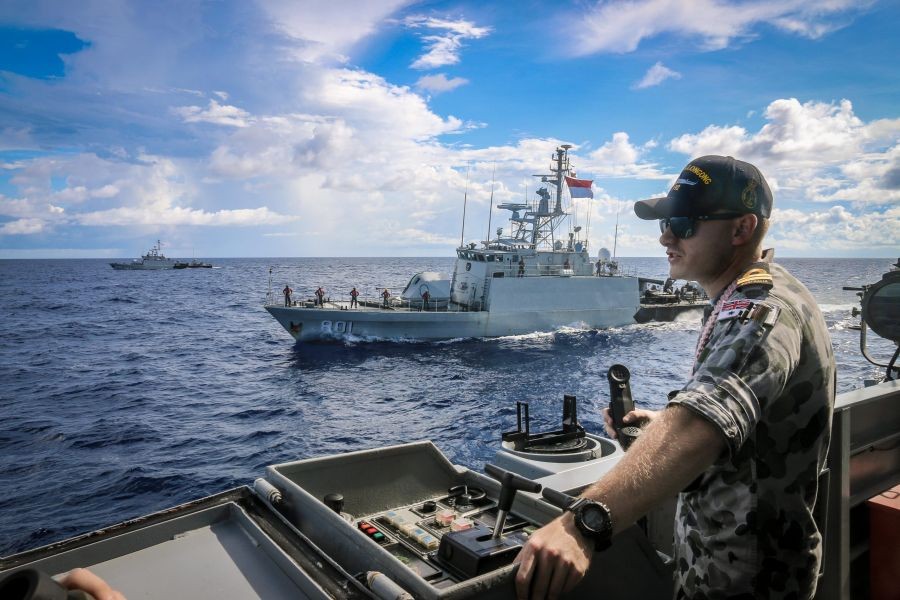In recent years, geopolitical tensions in the Asia-Pacific region have intensified, prompting strategic reassessments by numerous nations, including Australia. The question of whether the Australian Navy should be expanded to counter China’s growing influence is a subject of considerable debate. With China’s increasing maritime presence, particularly in the South China Sea, Australia faces a complex decision that involves balancing economic interests, national security, and regional stability.
The Current Geopolitical Landscape
China's expansion in the South China Sea has been characterized by the construction of artificial islands and increased naval patrols, which have raised concerns among neighboring countries and Western nations alike. For Australia, a nation heavily reliant on maritime trade, ensuring freedom of navigation in these international waters is crucial. According to the Australian Bureau of Statistics (ABS), over 99% of Australia’s international trade by volume is conducted by sea, underscoring the importance of secure maritime routes.
Australia's Economic Ties with China
China is Australia's largest trading partner, with bilateral trade amounting to AUD 235 billion in 2022, according to the Australian Treasury. This economic interdependence complicates the decision to expand military capabilities aimed at countering Chinese influence. While strengthening naval forces could safeguard trade routes, it might also strain diplomatic relations and impact economic ties.
The Case for Naval Expansion
Proponents of expanding the Australian Navy argue that a robust naval presence is essential for national security and maintaining regional influence. An expanded navy could deter potential threats and ensure Australia’s sovereignty over its maritime territories. This viewpoint is supported by the Australian Strategic Policy Institute, which highlights the need for a capable maritime force to counterbalance growing regional powers.
Case Study: Japan's Naval Modernization
Japan offers a relevant example of a nation responding to regional threats through naval modernization. Faced with similar geopolitical challenges, Japan has increased its defense budget annually, focusing on advanced maritime capabilities. This strategy has allowed Japan to maintain a strategic balance in the region while safeguarding its economic interests. Australia could draw lessons from Japan’s approach, emphasizing the importance of a modern, capable navy.
The Counterarguments
On the other hand, critics argue that expanding the navy might provoke a regional arms race, leading to heightened tensions and instability. They contend that diplomatic engagement and multilateral cooperation are more sustainable strategies for addressing regional issues. Moreover, the financial implications of naval expansion are significant, with potential impacts on the national budget and other essential sectors.
Economic Considerations
According to the Reserve Bank of Australia (RBA), the defense sector's expansion requires substantial financial resources, which could divert funds from other critical areas such as healthcare and education. Balancing defense spending with economic stability is a crucial consideration for policymakers.
Pros and Cons of Naval Expansion
To provide a balanced perspective, it is essential to consider the pros and cons of expanding the Australian Navy:
Pros:
- Enhanced Security: Improved naval capabilities can deter potential threats and protect national interests.
- Regional Influence: A strong navy bolsters Australia’s strategic influence in the Asia-Pacific region.
- Economic Protection: Safeguarding trade routes ensures the continued flow of goods and services.
Cons:
- Increased Tensions: Naval expansion could exacerbate regional tensions and provoke an arms race.
- Economic Impact: The financial burden of expansion might affect other critical sectors.
- Diplomatic Strain: Strengthening military capabilities could strain diplomatic relations with China.
Future Trends and Predictions
Looking ahead, the strategic landscape in the Asia-Pacific region is likely to evolve, with China continuing to assert its influence. According to a report by the Australian National University, by 2030, nations in the region are expected to increase defense spending by an average of 40% to counterbalance China's military expansion. Australia may need to adopt a multifaceted approach, combining military readiness with diplomatic efforts to ensure regional stability.
Conclusion
The decision to expand the Australian Navy involves complex considerations, balancing national security with economic and diplomatic factors. While a stronger naval presence can enhance Australia’s security and regional influence, it also poses risks of increased tensions and economic strain. Ultimately, a strategic approach that integrates military preparedness with diplomatic engagement may offer the most sustainable path forward.
What’s your take on this issue? Share your insights in the comments below!
People Also Ask (FAQ)
- How does China’s influence impact Australia’s security?China's growing maritime presence challenges Australia's ability to maintain secure trade routes, affecting national security and economic interests.
- What are the economic implications of naval expansion?Naval expansion requires significant financial resources, which may affect funding for other sectors, such as healthcare and education.
- How can Australia balance military and diplomatic strategies?Australia can integrate military readiness with diplomatic engagement to address regional challenges while maintaining economic and political relationships.
Related Search Queries
- Australia-China trade relations
- Australian Navy expansion plans
- Geopolitical tensions in Asia-Pacific
- Impact of China’s influence on Australia
- Australia defense spending 2025

































TrudyHunge
10 months ago